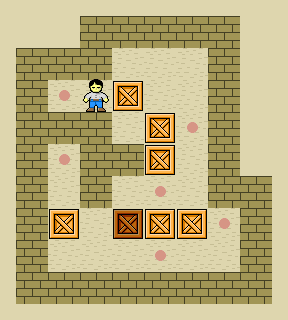
Sokoban is a puzzle video game in which the player pushes boxes around in a warehouse, trying to get them to storage locations. The game was designed in 1981 by Hiroyuki Imabayashi, and first published in December 1982.
A puzzle is a game, problem, or toy that tests a person's ingenuity or knowledge. In a puzzle, the solver is expected to put pieces together in a logical way, in order to find the solution of the puzzle. There are different genres of puzzles, such as crossword puzzles, word-search puzzles, number puzzles, relational puzzles, and logic puzzles. The academic study of puzzles is called enigmatology.

Enigma is a puzzle video game based on Oxyd, and is released under the GNU GPL-2.0-or-later. Enigma continues to be very popular as an open source multi-platform derivative of Oxyd now that Oxyd is no longer maintained. The open source fangame Enigma has been praised in reviews.

The Incredible Machine (TIM) is a series of video games in which players create a series of Rube Goldberg devices. They were originally designed and coded by Kevin Ryan and produced by Jeff Tunnell, the now-defunct Jeff Tunnell Productions, and published by Dynamix; the 1993 through 1995 versions had the same development team, but the later 2000–2001 games have different designers. All versions were published by Sierra Entertainment. The entire series and intellectual property were acquired by Jeff Tunnell-founded PushButton Labs in October 2009. PushButton Labs was later acquired by Playdom, itself a division of Disney Interactive, so as of now the rights are held by The Walt Disney Company.

Darwinia is a 2005 real-time tactics and real-time strategy video game for Microsoft Windows, Mac OS X and Linux. It is the second game developed by Introversion Software, and is set within a computer environment that simulates artificial intelligence. It received favourable reviews and won three awards at the 2006 Independent Games Festival. A multiplayer sequel, Multiwinia, was released for Windows in 2008. Darwinia and Multiwinia were released together as Darwinia+ for the Xbox 360 in 2010.

Anticipation is a video board game developed by Rare and released by Nintendo for the Nintendo Entertainment System (NES) in 1988. It is playable in either single-player or multiplayer mode, with up to four players competing against each other and/or computer-controlled opponents.

Smart Bomb is a timed puzzle video game for the PSP developed by Core Design. It was one of the first video games to be released on the PSP and was at first set to be a big game, yet many control flaws and repetition of levels meant that it was a relatively low selling game. This is the last game Core Design worked on before it was renamed Rebellion Derby the following year; R.D. would close its doors in March 2010.

Bookworm is a word-forming puzzle video game by PopCap Games. From a grid of available letters, players connect letters to form words. As words are formed, they are removed from the grid and the remaining letters collapse to fill the available space. Players earn more points by creating longer words or words which use less common letters and earn less for smaller words. In November 2006, PopCap Games released a sequel, Bookworm Adventures. Bookworm was released for the Nintendo DS digital distribution service DSiWare on November 30, 2009. It has also been released on the regular Nintendo DS cartridge. Bookworm is the most downloaded word puzzle game, being downloaded over 100 million times. The Deluxe version of the game features updated graphics, Action Game, and the Hall of Fame.
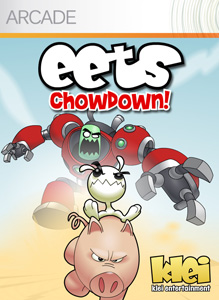
Eets is a 2D puzzle video game developed by Klei Entertainment and released on March 27, 2006 for Microsoft Windows. It was later released for Mac OS X on December 9, 2010. Both the Windows and Macintosh versions of the game are distributed digitally via Steam. On April 25, 2007 the game was released for the Xbox 360 via Xbox Live Arcade under the title Eets: Chowdown. Eets is a puzzle game with similarities to Lemmings where players must guide a character through an on-screen puzzle.

Picross DS (ピクロスDS) is a puzzle video game developed by Jupiter and published by Nintendo for the Nintendo DS handheld video game console. It is the second Picross game to be released by Nintendo in Europe and North America after Mario's Picross suffered a commercial failure in regions outside Japan, where many Picross games have been released for several Nintendo consoles. Like other Picross games, it presents the player with a series of nonogram logic puzzles to solve. It was first released in Japan, and was later released in North America, Europe and Australia.

PQ2: Practical Intelligence Quotient 2 is a puzzle game for the PlayStation Portable, and a sequel to PQ: Practical Intelligence Quotient. The game is based on testing the model of human intelligence developed by Dr. Masuo Koyasu at Kyoto University.

There is an abundance of go software available to support players of the game of Go. This includes software programs that play Go themselves, programs that can be used to view and/or edit game records and diagrams, programs that allow the user to search for patterns in the games of strong players and programs that allow users to play against each other over the Internet.
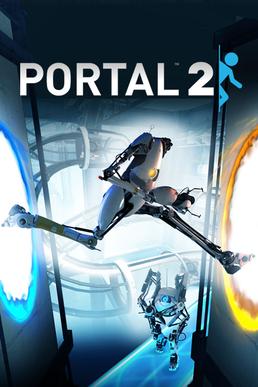
Portal 2 is a 2011 puzzle-platform game developed by Valve for Windows, Mac OS X, Linux, PlayStation 3, and Xbox 360. The digital PC version is distributed online by Valve's Steam service, while all retail editions were distributed by Electronic Arts. A port for the Nintendo Switch was included as part of Portal: Companion Collection.
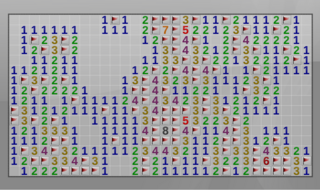
Minesweeper is a logic puzzle video game genre generally played on personal computers. The game features a grid of clickable tiles, with hidden "mines" scattered throughout the board. The objective is to clear the board without detonating any mines, with help from clues about the number of neighboring mines in each field. Variants of Minesweeper have been made that expand on the basic concepts, such as Minesweeper X, Crossmines, and Minehunt. Minesweeper has been incorporated as a minigame in other games, such as RuneScape and Minecraft's 2015 April Fools update.

Professor Layton and the Last Specter, known in Europe as Professor Layton and the Spectre's Call, is a puzzle adventure video game produced by Level-5 for the Nintendo DS handheld game console. Last Specter is the fourth game in the Professor Layton series, and is a prequel that takes place three years before the first trilogy, detailing how Professor Layton met his apprentice, Luke Triton and introducing Layton's assistant Emmy Altava.

Professor Layton and the Miracle Mask is a puzzle adventure video game developed by Level-5. It is the fifth game in the Professor Layton series, the second in the prequel trilogy of games, and the first in the series to be developed for the Nintendo 3DS. Miracle Mask was released as a launch title for the Nintendo 3DS in Japan in February 2011, becoming the best-selling game on the day of the system's launch. The game was later released worldwide in October 2012. Professor Layton and the Miracle Mask Plus, an enhanced edition featuring new puzzles and added cutscenes, was released on the Nintendo eShop in Japan in February 2013.

Phylo is an experimental video game about multiple sequence alignment optimisation. Developed by the McGill Centre for Bioinformatics, it was originally released as a free Flash game in November 2010. Designed as a game with a purpose, players solve pattern-matching puzzles that represent nucleotide sequences of different phylogenetic taxa to optimize alignments over a computer algorithm. By aligning together each nucleotide sequence, represented as differently coloured blocks, players attempt to create the highest point value score for each set of sequences by matching as many colours as possible and minimizing gaps.

Garshasp: The Monster Slayer is a third-person action-adventure video game developed by Fanafzar Sharif Studios and Dead Mage Inc. for Microsoft Windows. The story and the game are based on the adventures of the mythological Persian monster-slayer Garshasp. a Standalone Expansion Pack Garshasp: Temple of the Dragon was released in 2012.
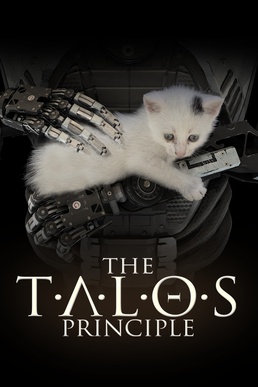
The Talos Principle is a 2014 puzzle video game developed by Croteam and published by Devolver Digital. It was simultaneously released on Linux, OS X and Windows in December 2014. It was released for Android in May 2015, for PlayStation 4 in October 2015, for iOS in October 2017, for Xbox One in August 2018, and Nintendo Switch in December 2019. Virtual reality-enabled versions for the Oculus Rift and HTC Vive were released on 18 October 2017. The downloadable content Road to Gehenna was released on 23 July 2015.

BoxBoy! + BoxGirl! is a puzzle-platform game developed by HAL Laboratory and published by Nintendo for the Nintendo Switch. It is the fourth game in the BoxBoy! series, a follow-up to Bye-Bye BoxBoy! (2017), and is first installment to be released outside the Nintendo 3DS. The game also features a two-player multiplayer mode, a first for the series.


















